Clinic escorts, who help patients at the Jackson Women’s Health Organization avoid anti-abortion protesters, engage with child protesters on the sidewalk in Fondren on Jan. 24, 2019. Photo by Ashton Pittman.
"We've notified the police. And they will come around and interview you." A half century after she had an illegal abortion in Alabama, Libby Rich still remembers hearing those words as she left the hospital. The crude procedure had left her with an infection that almost killed her. When doctors examined Rich, they immediately knew what the gravely ill 19-year-old woman had done.
"I cannot bear the thought of another woman seeking an illegal abortion," said Rich, now 69 and wearing a red-and-black checkered flannel shirt, her glasses helping to keep her darkly grizzled, chest-length hair pushed back behind her ears.
She spoke those words on Jan. 22, while standing under a tent in the parking lot of the Jackson Women's Health Organization in Jackson. Also known as the Pink House for its bright color, it is Mississippi's last standing abortion clinic, which makes it a magnet for anti-abortion activists around the country.
Gathered around Rich, roughly two dozen abortion-rights activists, including her friend, clinic owner Diane Derzis, hung onto every word she said.
The activists were celebrating the anniversary of Roe v. Wade—the landmark 1973 Supreme Court decision that declared abortion a right and overturned bans in states including Alabama and Mississippi. Now, with the U.S. Supreme Court partially remade to please President Donald Trump's evangelical base, the rights that ruling secured for women are more imperiled than at any point in the past 46 years.
Red states, emboldened by the new regime, are passing hardline anti-abortion laws aimed at triggering a reconsideration of Roe at the nation's highest court—laws like the fetal heartbeat bills the Mississippi House and Senate passed on Feb. 13. Those bills, which Gov. Phil Bryant says he will sign into law once the two chambers decide on a single version, ban abortions after a heartbeat is detectable—a de facto ban on all abortions at around six weeks.
In 2011, Mississippi resoundingly defeated the Personhood Amendment, which would have banned all abortions for any reason. Even so, nine House Democrats voted for the new six-week ban, including a Democratic candidate for lieutenant governor, Oxford Rep. Jay Hughes. One Republican, Rep. Missy McGee of Hattiesburg, voted against it.
McGee explained her vote by citing the fact that, while the bill does include an exception for the life of the mother, it has no exceptions for rape, incest or severe fetal deformities. Lawmakers defeated an amendment, supported by Hughes and McGee, to add exceptions for rape and incest. Republicans defeated a similar amendment in the Senate.
The heartbeat bills did not originate in Mississippi. Outside anti-abortion groups wrote the model legislation, which the Mississippi Legislature embraced, with only minor tweaks. Lawmakers have introduced bills with nearly identical language in other state legislatures, too, including Alabama, Kansas, West Virginia and Ohio.
'We Know What You've Done'
Weeks before those bills passed, Rich shared her story—a horror from the past that she and her compatriots fear could also be a vision of the future. She was among the last generation of women in the Deep South to seek an abortion pre-Roe, when the procedure was still outlawed in many states.
At age 15, Rich told the sympathetic crowd, she left home to escape an abusive family, got married and became a mother.
"My family, of course, being fine southerners and this being 50 years ago, disowned me," Rich said. "I was judged to be an unfit mother. And so my son was given up. I checked myself into a psychiatric ward because I had tried to commit suicide, thinking that life was not worth living."
Rich was smart, and staff at the psychiatric ward encouraged her to pursue a college education at the University of Alabama at Birmingham. To make that happen, they granted her a scholarship on the condition that she allow them to assign a psychiatrist to her.
That psychiatrist, she said, seduced her. Despite the fact that she was on birth control at the time, Rich got pregnant. After everything she had been through, having another child was not an option.
This was 1968, though, and the Roe ruling was still five years away. Except in cases in which a pregnancy imperiled a woman's life or health, anyone caught helping induce an abortion in Alabama at that time faced up to a year of hard labor.
Considering her health struggles, Rich went to UAB's ob-gyn clinic to apply for a therapeutic abortion. "I was turned down by three white male doctors, saying, 'You're perfectly healthy. There's no reason why you cannot complete your pregnancy and give the child up for adoption,'" she recounted. If she had $600, Rich could have traveled to Louisiana for an abortion. She did not have that kind of money, but she did have half of it.
"So I went underground, and I obtained an illegal abortion in North Birmingham," she told the sympathetic audience, their breaths bated as she choked back tears. "And I watched a woman put a pot of boiling water on the stove and insert a tube into it. She told me to lay down on her enamel table, spread my legs, that she would insert the tube, and that within 24 hours, (the pregnancy) would be aborted. I paid her $300."
The woman did not tell her that the primitive, homespun abortion could prove deadly. Rich would have died at home, she said, if a co-worker had not come by to do a wellness check two days later. She rushed Rich to a hospital, dropped her off, and left, not wanting to participate in any questions the doctors might ask.
"And sure enough, the doctors stood over me and said, 'We know what you have done ... we will call the police," Rich said, dabbing her eyes with tissue. "And I said, 'Please, save my life,' knowing that if I confessed to what I had done, I could be prosecuted."
Save her life, they did. While she was recovering, though, doctors told her the procedure had left so much scarring in her uterus that she would be sterile for life.
"I thanked them for saving my life," she said, recounting the day she left the hospital. "As I was leaving, they said, 'We've notified the police. And they will come around and interview you.' For months, I was terrified that the police would come to my house and tell on me or arrest me."
That never happened, but still, she said, it "was one of the cruelest experiences I've ever been through in my life."
'The Lie of the Land'
Sarah Hartshorne wiped tears from her eyes as she stood nearby, leaning against the wooden fence that the clinic erected to shield patients from anti-abortion protesters. She is a young New York-based writer, comedian and model whose appearances include Vogue, Glamour, and "America's Next Top Model." She is also an activist with the New York-based Lady Parts Justice League.
Earlier that day, Hartshorne and other members of the organization joined defenders of the Jackson clinic at the Capitol. There, they counter-protested Operation Save America, an anti-abortion extremist organization. Originally called Operation Rescue, OSA has a history of targeted harassment of abortion providers and patients.
In June 2009, Scott Roeder, a man with ties to a Kansas branch that still calls itself Operation Rescue, walked into a Lutheran church in Kansas and shot George Tiller, an abortion-clinic doctor whom the group had long protested, in the head. Tiller, a church usher, was handing out church bulletins when Roeder killed him. After the assassination, Randall Terry, who founded the original Operation Rescue in 1986, held a press conference to say Tiller got what was coming to him.
"George Tiller was a mass murderer and, horrifically, he reaped what he sowed," Terry said at the time.
Standing on the steps of the Mississippi Capitol last month, a parade of white men from Operation Save America preached fire-and-brimstone against feminists and "homosexuals," one after another, for hours on end. Two of the men held 5-foot-tall red, blue and white placards. "Establish Justice, End Abortion Now," one placard read "Roe Is Not The Law of the Land, It Is The Lie of the Land," read the other.
The Mississippi flag with its Confederate imagery waved overhead, as a crowd of about a hundred gathered on either side around a statue dedicated to the women of the Confederacy.
Between the Capitol steps and Mississippi Street stood a tall man in his late 50s wearing a black cowboy hat. Tucked under his jeans behind a large oval belt buckle was a bright red shirt with an unmissable, all-caps "One Nation Under God" emblazoned across it. He stood smack in the center between OSA and dozens of counter protesters on the sidewalk who came to support The Pink House. Holding a giant Bible, he stared straight ahead at the abortion-rights activists, like a solemn statue.
When asked his name, the man offered only a small booklet. "It's all in there," he said, handing over a classic evangelical tract that warns of the dangers of eternal hellfire for those who do not accept Jesus Christ as their savior.
The back of the tract, though, served as a business card. His name was Alan Hoyle and he, like the abortion bills in the Legislature and like most people on either side of Mississippi's abortion debate that day, was from out of state. Last year, Hoyle ran for sheriff in Lincoln County, N.C., where he lives.
After a neo-Confederate gunman massacred nine black churchgoers in Charleston, S.C., in 2015, Hoyle showed up to protest the state's decision to remove the Confederate flag that, until then, still flew on the Capitol grounds. He was carrying the same Bible then as he carried to Mississippi in January, but on that day in 2015, he also carried a Confederate flag and a placard of an interracial gay couple kissing, with a line drawn through them and the word "sin" written between their foreheads.
Though Hoyle has devoted his life to the cause of what he calls "the unborn," a judge barred him in 2014 from contact with his own six children until they turn 18 after convicting him of stalking his ex-wife. That was not his first scrape with the law. In 2013, Capitol police in Washington, D.C., charged him with carrying a gun onto the property illegally when he arrived to protest a Senate vote on guns.
Hoyle has been to Mississippi before. On the 40th anniversary of Roe v. Wade in 2013, he drove around the Pink House—which was still gray at the time—in his "abortion truck," which is covered in images purported to be of aborted fetuses.
On that 2013 day, members of OSA joined Hoyle in his protest, carrying a tiny white coffin to the steps of the state Capitol. They claimed that the remains of a 14-week old aborted fetus they had named "Baby Daniel" was inside the coffin, which they invited people to look at and touch.
Later that day outside the clinic, Metairie, La., resident Laura Patout, who was 55 at the time, broke down in tears as she described seeing Baby Daniel. She said she carried shame with her because she had an abortion when she was just 18. On the sidewalk nearby, Hoyle, dressed in tattered brown robes like that of a biblical figure and carrying a shofar, a traditional Jewish musical instrument made from a ram's horn, carried a large placard with an aborted fetus on it.
For months in 2013, OSA toured the country with the tiny coffin. Then, in Rochester, N.Y., in July, the group held a memorial service, complete with bagpipes, pallbearers and a sermon by Frank Pavone, the national director of Priests for Life.
"Fr. Pavone then encouraged mourners to reach out and literally touch Daniel," OSA recounted in a July 25, 2013, blog post. "The children seemed especially moved by Daniel's death, with child after child reaching out to tenderly touch the bruised body. It was a timeless moment of hope and grief, as the young mourned the youngest."
The mourners gave "Baby Daniel" a surname: Pavone, in honor of the priest.
Six years after OSA invited Mississippians to look in the coffin, Hoyle was there once again. For abortion-rights activists, though, the stakes were significantly heightened.
Mississippi vs. Roe v. Wade
Directly in Hoyle's line of sight last month, Sarah Hartshorne, surrounded by several dozen other abortion-rights activists, used a bullhorn to counter OSA members who were comparing abortion to slavery: "What we don't need is another white man talking about slavery," she announced.
With her was Lizz Winstead, who is also an activist with Lady Parts. Part of the goal of their organization, Winstead told the Jackson Free Press, is to educate people about the importance of state legislatures in "protecting things (they) hold dear," whether that means abortion rights, LGBTQ rights, gun rights or otherwise.
"I think folks on the left have not understood that for a very long time, and conservatives have understood that profoundly," she said. "So right now, when we do not have someone in the White House who is friendly to those issues, we have to educate people to get out in every election so, if laws are going to go through the courts, they can at least elect people who prevent those from becoming laws in the first place."
Last year, lawmakers in the Mississippi Legislature passed a law banning abortions after 15 weeks. A federal judge struck that law down, but Democratic Attorney General Jim Hood, who is running for governor, is appealing the ruling to the 5th U.S. Circuit Court of Appeals in Texas, which he says is his obligation to do in his current position.
Republicans in the Mississippi Legislature hope that law, or one like it, will make it to the U.S. Supreme Court. During Senate debate over the heartbeat bill on Feb. 13, Republican Sens. Chris McDaniel of Ellisville and Joey Fillingane of Sumrall alluded to Justice Brett Kavanaugh, whom President Trump appointed to the Supreme Court last year.
The conservative Kavanaugh, Fillingane noted, replaced former Justice Anthony Kennedy, who was the swing vote that saved Roe from being overturned in 1992. For the first time in decades, anti-abortion lawmakers and activists see an opportunity to achieve the holy grail of the pro-life movement: the overturn of Roe v. Wade.
'A Duty to Obey God,' Not Men
On Feb. 7, Kavanaugh boosted hopes among anti-abortion activists when he dissented from a Supreme Court opinion blocking a law in Louisiana that would shut down all but one abortion clinic in the state.
"We have forgotten that the Supreme Court is not the Supreme Being," OSA National Director Rusty Lee Thomas bellowed from the Mississippi Capitol steps on Jan. 22.
Nearby, men with OSA kept approaching the pro-Roe counter protesters to argue. One of those men was Joseph Spurgeon, a pastor in the conservative Reformed Church in America denomination and a local OSA leader from Louisville, Ky. Wearing a cowboy hat and standing next to his wife and kids, he told the Jackson Free Press he came "to encourage the state of Mississippi to put an end to abortion" and shut down Mississippi's last abortion clinic.
Eight out of the nine justices on the court when it decided Roe v. Wade were Republican appointees, including Nixon-appointed Chief Justice Warren Burger, Spurgeon noted. The only Democratic-appointed justice at the time, Byron White, dissented. Even with Kavanaugh now, though, Spurgeon is skeptical that a 5-4 Republican court would overturn it.
"Our hope is not in the federal government," he said. "The argument that we bring to the table is that the lesser magistrates, the lower forms of government like the state government, they have a duty to obey God rather than men. And that includes when the Supreme Court has ruled something like murder to be legal. The states should ignore that. I have no hope, no faith, in the Supreme Court. It was Republicans, for one, who gave us Roe v. Wade."
Spurgeon does not consider Trump a Christian. In fact, he said, he thinks adultery should be illegal and, if it were, that Trump would deserve to be impeached for it. He said he understands why some evangelicals do see Trump as a "blunt instrument" they can use for their purposes, though.
"Yeah, he's foulmouthed, and not somebody that I can really get behind and support," he said. "But I see, in many ways, many people hate him, but really what they hate is all the people that supported him. And so I think some Christians see him as standing in between them and a bunch of people who really don't want them to exist any more."
Spurgeon compared OSA's leaders and movement to Martin Luther King Jr. and the Civil Rights Movement. One big difference, he said, is that far more anti-abortion protesters have been arrested than civil-rights protesters, though he offered no evidence to back up that claim.
'Furthest Thing From Pro-Life'
Anti-abortion activists, who are overwhelmingly white and evangelical, often invoke African Americans and the Civil Rights Movement to validate their own. When the Senate heartbeat bill was still in committee, Fillingane highlighted the fact that the majority of women getting abortions in Jackson, a majority black city, are African American.
"And all are precious in his sight," Fillangane added.
Laurie Bertram Roberts, who is black, is the co-founder and director of the Mississippi Reproductive Freedom Fund, the only abortion fund in the state. If legislators like Fillingane are worried about black babies, she told the Jackson Free Press on Feb. 6, they should support expanding health-care access and work to improve black maternal health and infant mortality.
"It's very easy to shame black women and black motherhood," she said. "It's one of Mississippi lawmakers' favorite things to do, especially on the right. If they're not attacking black women for having abortions, they're attacking us for using SNAP benefits, or TANF."
At the Jan. 22 OSA protest, while its leaders lobbed attacks on feminists, gays, transgender people and Catholics, Libby Rich stood on the steps next to the speakers where she communicated with the crowd using American Sign Language.
"I decided that I was going to piss on their parade," she told the activists outside the Pink House later that afternoon. "I walked back and forth across the stage and let them know. I wanted them to know that I was there."
"I stood in front of their signs and danced to the music—the 'Jesus songs' is what I call them," she continued. "And then I started signing. And when this really vicious man started spewing out his hate, I signed, 'You are such a bad person. God will never forgive you for this. You have no love. You have no compassion. You are anti-choice.'"
The Alabama woman whose life nearly ended a half century ago because of anti-abortion laws said she rejects the idea that men like Spurgeon and his OSA comrades are "pro-life."
"Pro-life needs to be stripped from them," Libby Rich said. "We should not any longer allow them to say they are pro-life. They are the furthest thing from pro-life."
Email state reporter Ashton Pittman at [email protected]. Read related coverage at jacksonfreepress.com/abortion.
More stories by this author
- Governor Attempts to Ban Mississippi Abortions, Citing Need to Preserve PPE
- Rep. Palazzo: Rural Hospitals ‘On Brink’ of ‘Collapse,’ Need Relief Amid Pandemic
- Two Mississippi Congressmen Skip Vote on COVID-19 Emergency Response Bill
- 'Do Not Go to Church': Three Forrest County Coronavirus Cases Bring Warnings
- 'An Abortion Desert': Mississippi Women May Feel Effect of Louisiana Case

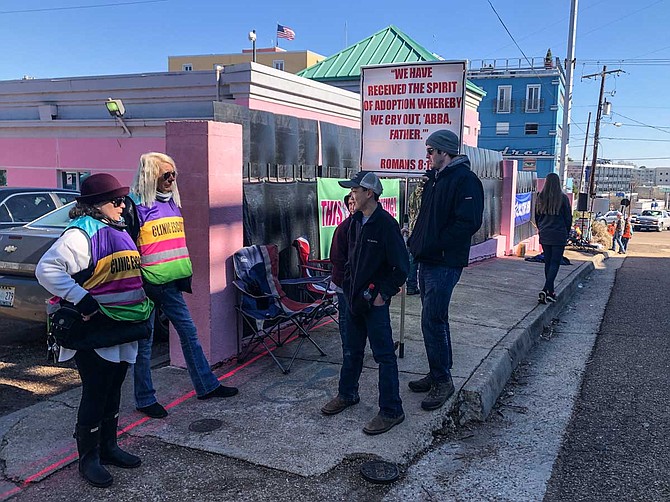
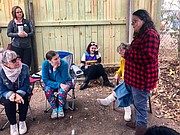
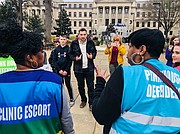
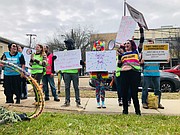
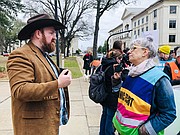
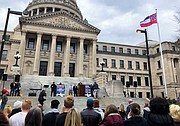

Comments
Use the comment form below to begin a discussion about this content.
comments powered by Disqus